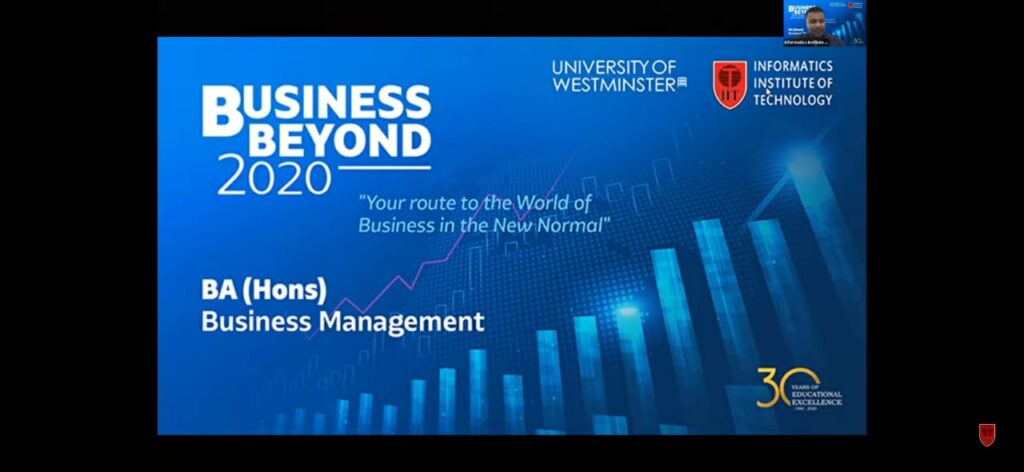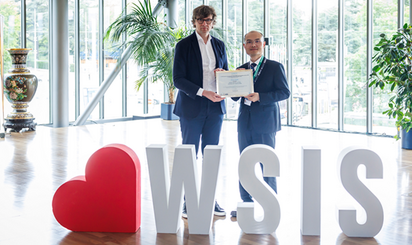IIT’s “Beyond Business 2020” webinar educates students of key challenges facing today’s business world

Informatics Institute of Technology (IIT), the pioneer in British higher education in Sri Lanka and the country’s premier IT and Business campus, successfully conducted “Business Beyond 2020”, an informative webinar which provided the audience comprising primarily of Advanced Level (A/L) students and parents a glimpse into the world of business in today’s pandemic-hit world.
Three experts with significant experience in different industries addressed the audience. They included Marketing Specialist Maneesha Keppetipola, Director Human Resources of AtLink Communications Ruvinika Siriwardene and Consultant and Head of Department Business of IIT Austen Mascranghe. The Moderator for the webinar was Havendra Gunawardena – Lecturer of IIT and Consultant and Project Manager.
Maneesha Keppetipola, who has served in many different industries including Telco, Retail and Apparel, addressed the issue of the most critical changes of COVID-19 for people today. “It is clear that various sectors and industries are undergoing drastic changes as the traditional way of doing things is not suitable in today’s pandemic world. While the COVID-19 pandemic may pass in a year or two the technological advances are here to stay. Among the industries that are undergoing major changes is the Retail industry where the general public has found it much more convenient, hassle-free and safer to carry out shopping online and get their orders delivered home. Supermarkets, even the smaller ones, have all gone online. FMCG companies have also started selling directly to customers through their online platforms.” She added that another industry that has changed significantly is the Telco industry. “Telco companies have come up with several advancements and are enjoying high growth and revenue. Many products have been launched, such as Work From Home and Online Study packages that are catered to the new requirements of today.” Touching upon the trending areas of focus in business, she stated that advertisers are increasingly turning to social media advertising to reach their target audience. “Less people are reading newspapers and watching TV. Youngsters are on social media platforms like Facebook, YouTube, Snapchat and Instagram. Social media allows for better measuring of results and outcomes through metrics such as Number of Views, Clickthrough Rates, Likes, Comments, Shares and many others. Since you can make a significant impact with a lesser budget, social media advertising is the future of advertising and organisations are increasingly giving it a high level of priority.”
Tapping into her experience in human resources, Ruvinika Siriwardene pointed out that the key is to stay positive in any bad situation and always see the good side of things, stating, “If you stay positive you give the mind the ability to create and be innovative.” She mentioned how companies must be ready to use technology to their advantage. “Data is the lifeblood of companies today and it is very important to have data when we work. Artificial Intelligence (AI) is redefining industries by automating process and disrupting how organisations work so we must be prepared.” In relation to the employability in the future, Siriwardene said that it’s important to obtain a degree for greater job opportunities. “While it’s good to have a degree, it’s not enough but you need to be able to communicate clearly in English. If you’re not able to market yourself when you face an interview you will lose out. So, this is a good time to improve on your soft skills.”
Analysing the impact of COVID-19 on Education sector and IIT’s response, Austen Mascranghe stated that there has been a mixed impact with many challenges. He stated, “According to the Teachers’ Union, teachers and schools are not equipped to handle technology, students cannot afford the telecommunication costs and some areas of the country have poor network connectivity.” He added that there were positive reports as well from many parts of the country. “Some students really liked online education as they are tech savvy. They found online education to be better than physical education as they can do their studies at their own pace.” Looking at the area of Higher Education, he divulged that IIT had also faced similar issues when the first lockdown came but they were able to overcome them quickly. “We also had the problem of telecommunication cost for students so we spoke to the Telco partners and put together a good educational data package and offered it to our students. They don’t have to spend any extra costs for online education. For our lecturers we were able to provide 4G routers without any cost. Our university partners in the UK already have the Best in Class Learning Management System (LMS), one of the best in the world, so all they had to do was simply to increase the capacity of their systems. As a very tech savvy organisation, all our students are very comfortable with modern technology even in Business Management. I am happy to say that we didn’t miss a single lecture due to the transition. When it comes to the Foundation course that we run on our own without the help of our overseas university partners, we were already using an LMS so they continued smoothly.”
Looking into the future of the job market, Austen Mascranghe stated that the key factors for the future are adaptability and resilience. “By following the Business Management degree at IIT, brought in collaboration with the University of Westminster, students can be assured that they become critical and creative thinkers, literate and effective communicators, possess the entrepreneurial spirit, are global in outlook and community engaged and are also socially, ethically and environmentally aware.”
IIT was established in 1990 as the first private higher education institute that awards reputed British degrees in the field of ICT and Business. IIT is an award-winning campus offering internal postgraduate and undergraduate degrees from the University of Westminster, UK and the Robert Gordon University, UK. IIT has played a pivotal role in strengthening the IT and Business sectors in Sri Lanka over the years by producing world-class graduates. Since its inception in 1990, IIT has produced over 5,000 graduates who are now based in many countries around the globe. These graduates have gone on to become successful entrepreneurs and IT/Business professionals in both local and international corporate and government entities. They have played a pivotal role in empowering over 250 multinational and local blue-chip companies by holding key strategic positions while contributing immensely towards the growth of their respective organizations.




Recent Comments